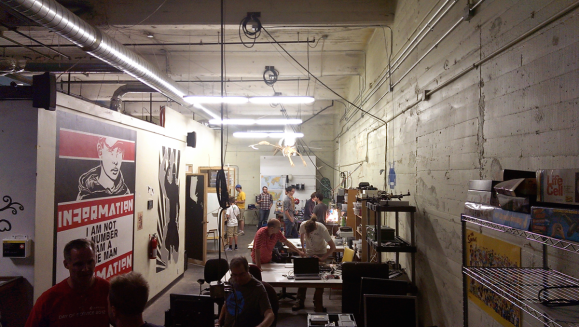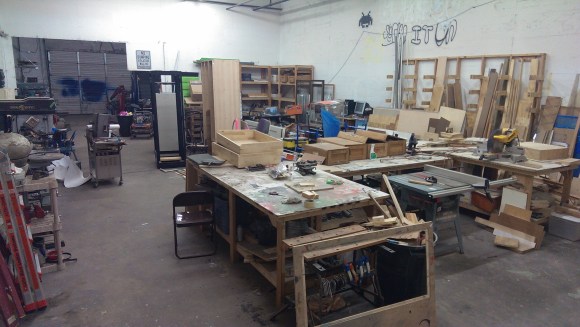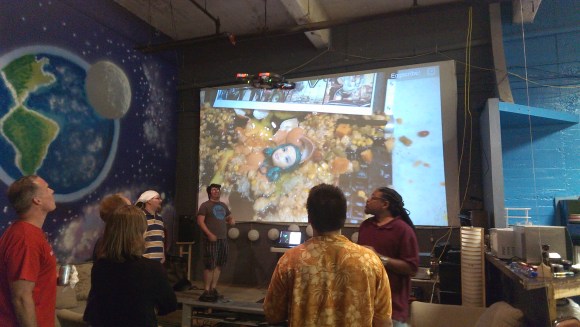
This week on Adventures in Hackerspacing, Freeside Atlanta Part II: Hacking the Hackerspace!
After learning about the culture behind the space, I was eager to ask hackerspace veterans [Alan] and [Steven] about nuts and bolts, about behind-the-scenes crucial decisions, and one question in particular: What’s the most important requirement for a hackerspace? [Alan] jumped in with this response:
Number one by and far is a willing landlord. I think if you have a willing landlord everything else is incidental. You make it hard on yourself if you are on the second story, but take the second story if you have a willing landlord.
That wasn’t the answer I was expecting, but when you look around Freeside, it starts to make sense…

Graffiti, street art, or some kind of mural covers nearly every wall, including a bowel-evacuatingly frightening Slenderman who lurks behind the bathroom door. I expected “size of the facility” to rank higher on their list—and at nearly 6,000 square feet, Freeside has heaps of leg room—but even a garage or a small office can function as a hackerspace for a handful of folks doing software or small electronics work.
Instead, [Alan] and [Steven] cast their vote for a place you can modify and improve. Freeside is located among the warehouses of the Metropolitan Business and Art District, which has a history of housing those who make creative use of the spaces. According to [Alan], Freeside is a conservative user of the property as compared to others in the same warehouse community. It’s also on the ground floor, because lugging heavy equipment up stairs is more trouble than it’s worth. There are exceptions. MASScollective, as [Alan] pointed out, is a three-story space with a freight elevator, so a space off the ground floor isn’t necessarily a deal-breaker. You just need to be creative about getting equipment above the ground floor.
[Alan] and [Steven] also took time to detail some of the legal issues that a hackerspace and its administrators may face. But first, the typical disclaimer:
I am not a lawyer, and the following information is not legal advice. [Alan] and [Steven] aren’t lawyers either, so be sure to consult an actual attorney before making any legal decisions about your hackerspace.
Freeside is officially a Georgia Non-Profit corporation, and they’ve applied for federal 501(c)(3) status, which comes with some tax breaks. Filing as a federal non-profit is quite the undertaking. [Alan] explained that the mountain of paperwork (around 80 pages) and increased responsibility for consistent and accurate record keeping can deter a space from applying. For Freeside, it’s worth the effort. Federal non-profit status looks good on grant applications, and [Steven] admits that they’ve been turned down for a few microgrants because Freeside’s still waiting to hear back on the 501(c)(3); their application is stuck in the backlog.
It’s also important to pick the correct type of organization for your space. Freeside chose 501(c)(3)—an educational and/or scientific organization—because they make an effort to educate the community and their members have published scholarly articles in the medical field. Some spaces go the route of the 501(c)(7)—social and recreational—because they can only claim to be a workshop organization.
They also pointed out the benefits of registering as a Limited Liability; if there’s a debt incurred by the organization, it’s founders are not liable for that debt. They can dissolve the corporation: assuming the organization has otherwise behaved responsibly. As [Steven] puts it, negligence trumps most legal safety nets, so it’s best to be above board on your paperwork and practices.
Then there’s the other kind of liability concern: safety.

Freeside has one hell of a workshop, and [Alan] was happy to give me a tour, but not before I strapped on the safety goggles that he handed me. No one expects members to walk in with an encyclopedic knowledge of how to operate every power tool. Whoever teaches you to use the big, loud equipment, however, is potentially liable for misuse by the trainee. If [Alan] taught you how to operate the table saw and you got hurt, whose fault is it? This was a problem that had Freeside members on edge. [Alan] explained how they approached the issue by carefully choosing the language that surrounds instruction, then securing a legal solution:
We don’t say ‘we certify’ you to use anything. There’s a welder guy we know who is able to actually certify people to weld, but if we’re doing a build-out of the space where we’re cutting 2×4’s, I’m going to assume that they’ll use the chop saw. If they use the table saw and hurt themselves, that’s where things get tricky. They volunteered, so they can’t hold Freeside responsible, but that doesn’t include me personally. So I took out an umbrella policy to protect me from things like that.
The personal umbrella insurance is less expensive than directors and officers insurance—which [Alan] only recommends if you plan to hire staff members (it covers equal opportunity, etc.) Now, as long as the Freeside guys aren’t creating a negligent environment, instruction is no longer a problem. You can check out Freeside’s policy page for more information and other guidelines. Many of these policies should be read as an “operations manual” rather than a strict rule book. Like most things at Freeside, their policies are empowered by fluidity.

Freeside has more stories to tell, but I’ll end the adventure here and instead suggest that you check out their space yourself. Swing by on Tuesday evenings for their open house, where you’re sure to meet plenty of friendly, knowledgeable folks, and can enjoy [Alan’s] bizarre taste in YouTube videos on the big screen.
A monumental thank you to both [Alan Fay] and [Steven Sutton] for tolerating over three hours of my questions and at least as many hours of lurking, and a much overdue thanks to my old friend [Brian Cribbs] for introducing me to the Freeside community.
Finally, I want to hear about your adventures. Drop me a line and tell me about your space’s politics, crazy mishaps, how you regulate safety, legal threats, the creepy guy who sat in his car outside your space while calling to ask if he can use it to put on a puppet show for children (You’ll have to ask [Steven] about that one), or anything you’d like to see in the next installment of Adventures in Hackerspacing.















Another adventure would be if they answered emails when someone has a large number of SMT parts they’d like to donate.
Apply water to the burnt area. **woosh**
Surplus SMT components are like kittens. Even if the person giving them away isn’t sarcastic and grating, it’s still a dubious proposition to accept them.
Our local hackerspace did return my emails about donations, and politely said “We don’t want your stinkin e-waste!” and suggested I attend meetings, bring my stuff with me, see if anyone there wants it, if not, haul it back, or pay storage. I’m talking about brand new items, like dozens of 5V regulated wall-wart power supplies. Thanks, but no thanks. The local “junk store” has a “free” pile, and no matter how worthless the stuff people leave there, it always disappears! Every time I left a bunch of stuff in the free pile, some of it always ended up for sale inside the store! (I have no problem with that).
Where is all of your free stuff coming from? Our hackerspace would be thrilled to take dozens of regulated 5v wall warts off your hands. I would also be interested to hear opinions on accepting so called “e-waste” to scavenge for parts and components. We are trying to get hooked up with an e-recycling program but our state government requires either R2 (Responsible Recycling Practices Standard) , or e-Stewards certification in order to be approved. From my initial googling it appears this would be cost prohibitive for our small startup hackerspace unless we could secure grant funding to defray the costs.
Be careful what you wish for. I was one of the founding members of Freeside, and was there when we went from meeting in a bar (Manuel’s Tavern, great place, very supportive) to meeting in our space. In the beginning, we accepted everything we could get our hands on. We thought “Hey, we’re a Hackerspace right? Obviously we can find some use for this thing, right?” But then the junk from teardowns started piling up because of the “Oh, someone might be able to use this random piece of scrap” mentality, which is all well and good, until there’s a big pile of junk that no one is going to even go through because its too much trouble (talking about A LOT of junk).
It wasn’t too long before we stopped taking in people’s old Pentium PCs, whether or not they ran, simply because the parts just sat around, and then we were stuck figuring out how on Earth to dispose of them properly (as well as cheaply and easily for the space and members). I can’t tell you how many times the question of “Who has a truck and is available?” came up on our mailing list in those early days. Consider each donation, and its actual immediate value to your space, very carefully before accepting any donations (especially 10+ year old PC’s).
This is just my 2 cents on the matter and a cautionary tale of we had to go through though. Every space is different and has its own special growing pains.
TLDR: Don’t become a dumping ground.
I really never gave much thought of insuring how to make sure that members using power tools know how to do so safely. While I would be a member or on the board of a hackerspace that doesn’t have liability insurance In that I’m a member of a hacker space that has liability insurance, I’d assume it will be the insurance carrier who bill be dictating What instruction will be required and who will be providing the instruction.